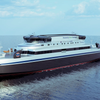Energy Supply Not Sustainable for Next Three Generations Says BP CEO
In a speech at the Kansas Renewable Energy Conference the President & CEO of BP's wind energy business advocates energy supply alternatives.
Extracts from John Graham's speech follow:
"The rules for energy supply that governed during the last three generations are likely not to be sustainable for the next three generations.
We are witnessing increasing demand growth from the rapidly-developing world economies; in just the next 20 years, the world energy demand will be 40% greater than today.
The fossil fuels extracted to burn and generate this extra power will add to the question of what do we do to manage the rising carbon levels in the environment. Fossil fuels are finite, the more they are consumed over the long term prices inevitably go higher which gives rise to the pragmatic need to diversify the sources of energy we have to give us more choice and at the same time address energy security given that hydrocarbon sources are located in only a few places around the world.
Frankly, as I look around, it is clear that some of the enthusiasm for renewable energy has fizzled out. A stagnant economy is damping energy demand and the emergence of new gas fracking has in a very short time driven gas prices to lows no one had forecast. And we can add to this picture some mismanagement in energy loan or grant programs.
But because of these factors I suggest now is time to double down on our efforts to find alternative energy sources – we cannot for ever extract from the earth as we do today and we have the means to create an “all of the above” energy legacy for the future generations just as we today benefit from the early oil pioneers who 100 years ago found the oil that makes our lives so prosperous today.
Wind is a free energy source that does not deplete over time as you use it. The price of Wind does not fluctuate from day to day as the other global commodities do.
Wind produces no harmful carbon emissions when it is converted into electricity. And North America and in particular states like Kansas are blessed with a plentiful supply of wind which farmers and ranchers tell me has caused them misery as they worked the land for many generations but now they see the wind as an opportunity to harness technology and convert the wind for the much needed electricity we all use and depend on.
Yet today, as I stand before you, much of the progress made in meeting America’s increased energy needs with clean, abundant and affordable U.S.-made energy, is in great jeopardy.
What we need to sustain this industry, but currently lack, is predictable, comprehensive energy policy that allows companies to plan over a reasonable period to attract investors to put their dollars to work and grow business to a scale sufficient for them to compete without federal help.
We have got to get away from the manner in which the federal law makers have ramped up and down support for renewable power.
Federal programs have been structured that are sometimes inefficient and leave investors reluctant to make the long term commitments which are so very necessary in the power business. Though some of the questions about the current tax based programs are well-justified, I would counter that the challenges renewable energy development faces do not justify ending the pursuit of renewable power generation, rather they justify reforming it.
The text in full of the speech is available here.










